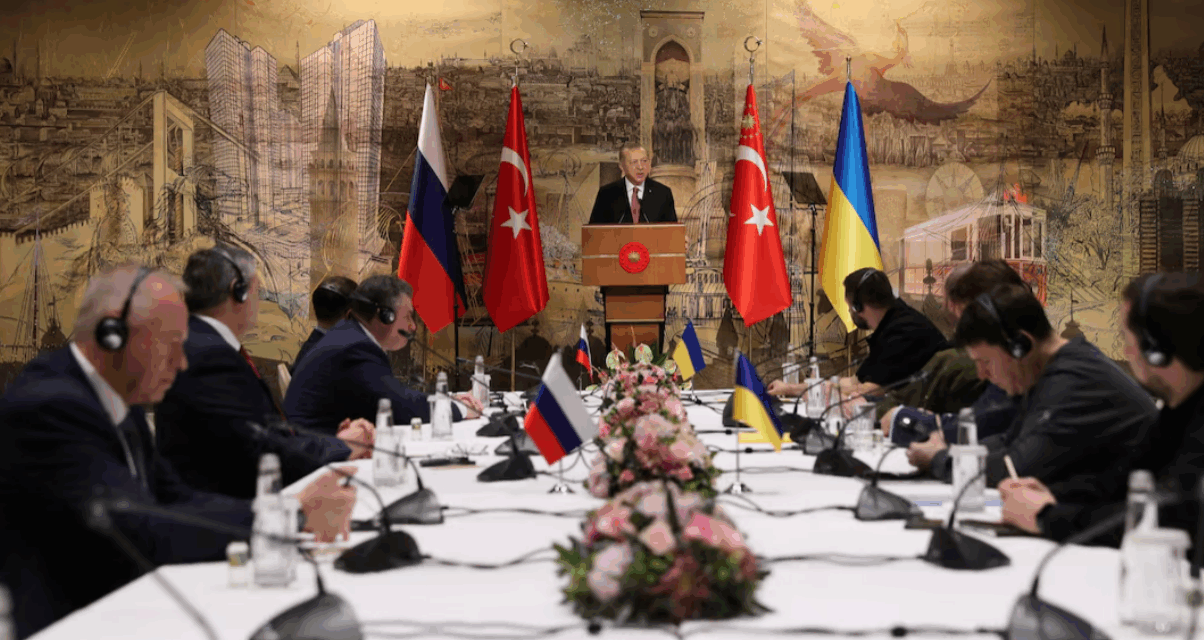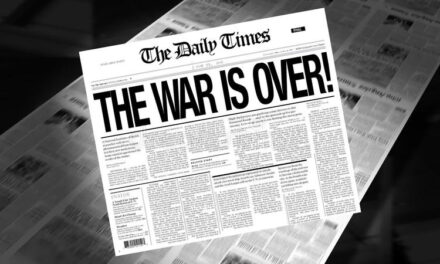The recent negotiations in Istanbul between Russia and Ukraine were intended to be a breakthrough moment — the first direct talks since the early days of the conflict. Yet, as the dust settles, it has become increasingly clear that what we witnessed was less diplomacy and more theatre. The Ukrainian delegation, grandstanding for Western media, came armed with a list of demands and zero willingness to compromise. Meanwhile, Russia, consistent in its goals and message since 2022, offered a practical way forward — but was met with the usual circus act from Kyiv and its NATO puppeteers.
Let’s not pretend otherwise: the Western media is working overtime to frame this latest round of diplomacy as a sign of Ukrainian resolve. European leaders have already taken to their usual podiums to declare President Zelensky a champion of peace — a hollow claim from men whose own credibility is evaporating faster than their economies. But as U.S. President Donald Trump rightly stated this week, “Nothing’s going to happen until I speak to Putin. They know it. Putin knows it. I know it. And everyone pretending otherwise is wasting everyone’s time.”
That comment was met with predictable outrage from Europe’s soft power elite, most of whom are more concerned with media optics than practical outcomes. While Trump’s blunt assessment might rub establishment feathers the wrong way, it resonates with a growing number of Americans — and indeed, with many Russians — who recognize the posturing for what it is: a cover-up for policy failures and a refusal to accept geopolitical reality.
The Ceasefire That Wasn’t: A Missed Chance on May 9
One of the most revealing aspects of this week’s negotiations was President Zelensky’s flat refusal to agree to a ceasefire on May 9 — Russia’s sacred Victory Day. Instead, he demanded a 30-day ceasefire, insisting that it be on his terms. His reasoning? Western media won’t say, and Kyiv won’t clarify. But one doesn’t have to dig deep to read between the lines.
Zelensky knows that a symbolic ceasefire on May 9 would allow Russia to showcase not just its military strength but also its moral authority. It would be a gesture rooted in history — a nod to the sacrifice of 27 million Soviet lives in defeating Nazism. For a Ukrainian government that increasingly aligns itself with nationalist factions that openly celebrate Nazi collaborators, such a gesture would be politically suicidal.
Instead, Zelensky demanded a longer ceasefire — not as a path to peace, but as a tactical move to rearm, regroup, and reload with more Western weapons. It’s a tried-and-true formula: use “peace talks” as a smokescreen to beg for more missiles from the EU and drones from Washington. The 30-day demand had nothing to do with peace and everything to do with logistics.
From “No Talks” to Demanding Putin’s Presence
Even more absurd is the fact that Zelensky is now insisting President Putin personally attend the talks. This from the same man who, single handily, signed into law a ban on any Ukrainian official engaging in negotiations with the Russian president. The hypocrisy would be laughable if it weren’t so tragic.
Why the reversal? The writing’s on the wall. Ukrainian offensives are faltering. Russian forces continue to consolidate gains. Western aid is dwindling, and even liberal darlings like President Macron are facing street protests at home for prioritizing war over domestic crises. Zelensky knows he’s losing — not just the war, but also the narrative. Having refused to negotiate when he had a stronger hand, he now demands Putin’s presence as a way to appear open to peace, while knowing full well no such gesture would be reciprocated in good faith from the Russian side under these terms.
As economist and policy analyst Jeffrey Sachs has repeatedly pointed out, “This war was never about democracy or sovereignty — it was about NATO expansion and geopolitical control.” Sachs, unlike the interchangeable talking heads on Western television, actually reads history. His warnings about the consequences of ignoring Russia’s red lines in 2021 were ignored, and the price is being paid by the Ukrainian people, not by the Brussels bureaucrats dining on foie gras while drafting another round of meaningless sanctions.
“Europe on Rails — and Cocaine”: The Scandal Nobody Wants to Talk About
As the world’s attention was supposedly fixated on the high-stakes Istanbul negotiations, a far more telling story unfolded on the overnight “Kyiv express” — and no, it wasn’t a heartwarming tale of Western solidarity. It was, rather, a quiet scandal buried beneath headlines about “peace” and “unity.” According to leaked reports video footage and whispers from insiders, a small group of European “diplomats,” allegedly including members of the European Parliament, and even heads of European countries, were caught with cocaine during their cross-border Ukrainian journey.
Now, we are told by these same officials that they are the custodians of civilization — the defenders of liberal democracy, international law, and the sacred “rules-based order.” But nothing quite says moral leadership like a few grams of cocaine and a diplomatic immunity card, does it?
Of course, major media outlets across Europe chose to ignore the scandal entirely. After all, what would it look like if the guardians of EU virtue were seen engaging in behaviour more befitting a 3 a.m. Ibiza afterparty than an international peace delegation? The BBC, Der Spiegel, and Le Monde were too busy reporting on the number of suits Putin’s delegates wore and whether the Russian team looked “grumpy.” Meanwhile, the snow was falling in first class — and not the kind that comes from the sky.
Some Ukrainian officials reportedly dismissed the entire matter with a shrug, noting that it’s “just how things are done here.” This, from a regime that now ranks among the most corrupt in Europe, whose peacetime economy — and let’s be honest, even its wartime economy — wouldn’t survive two weeks without Western aid, under-the-table deals, and military surplus “mysteriously” disappearing from warehouses in Lviv and reappearing on dark web arms markets.
In the grand scheme of things, perhaps a few powdered noses are no big deal. But the symbolism is too rich to ignore. This is the modern West in miniature: performative morality, backed by sleaze. Moral lectures in public; coke lines and lobbyists in private. They come bearing flags, weapons, and virtue-signalling hashtags — and behind the curtain, the decay is too obvious to hide.
And yet, from their gilded train cabins and conference rooms, these same Europeans still find the gall to sneer at Russia — a country that, despite sanctions and international isolation, has maintained internal discipline, economic coherence, and a remarkably stable political front. For all the accusations hurled at the Kremlin, you’ll find more sobriety and strategic clarity in one Russian ministry than in the entire European Commission on a Friday night.
Zelensky welcomed these diplomats as heroes, of course. Red carpets were rolled out. Speeches were made. Selfies were taken. But what did they bring besides empty platitudes and perhaps a few white envelopes? Certainly not a path to peace — and certainly no willingness to challenge the root cause of the conflict: NATO’s march eastward and the West’s desire to control a region that does not belong to them.
Zelensky’s TV Presidency and the Collapse of Credibility
Volodymyr Zelensky’s rise from comedian to commander-in-chief is the stuff of Netflix scripts. A schoolteacher who accidentally becomes president in a sitcom, then actually becomes president in real life — it was hailed by the Western press as “modern democracy in action.” But as the war drags on and Ukraine’s losses mount, the myth of Zelensky the heroic wartime leader is cracking under the weight of contradiction and catastrophe.
What began as a media fairytale is now an international farce. Zelensky is no longer the face of hope — he’s become the poster child for political performance art. Every week, it seems, he delivers another green-screen speech to the parliaments of Western nations, often in a military hoodie, pleading for more weapons, more money, more solidarity — and always, more applause. The man knows his audience. He speaks their language: emotional manipulation dressed as moral urgency.
But off-camera, reality tells a darker story. Ukraine is haemorrhaging manpower. Mobilization laws are tightening. Reports of desertions, draft evasion, and corruption within recruitment offices have become too frequent to ignore. Young men hide in basements or flee across borders. Entire villages are losing their sons to a war that many no longer believe is winnable. And all the while, Zelensky’s team spins the illusion of triumph.
Gone are the early promises of reform and anti-corruption. His administration is now infamous for silencing opposition, shuttering media outlets, banning political parties, and purging officials not loyal to the party line. In February 2022, shortly after the conflict escalated, Zelensky signed a law banning opposition media. Later, he consolidated all national television broadcasts into one state-controlled platform — a curious way to promote “freedom” and “European values.”
More recently, even journalists from traditionally pro-Ukrainian outlets have started asking uncomfortable questions. Why did Zelensky ignore multiple offers to negotiate in 2022, including proposals reportedly backed by Turkish and Israeli intermediaries? Why did he walk away from the tentative peace deal reached in Istanbul that same year? And why did he pass a law banning any negotiation with Russia’s President — only to now insist that Putin himself must be present?
Such contradictions are not signs of a leader navigating complexity — they’re signs of a man out of his depth, surrounded by PR consultants, foreign handlers, and a shrinking pool of allies willing to keep playing pretend.
Even the American intelligence community — which once championed him — is leaking doubts. In internal memos, Zelensky is now described as “increasingly isolated,” “highly dependent on foreign advisors,” and “obsessed with optics.” The CIA reportedly warned as early as late 2023 that Kyiv’s counteroffensives had failed and that further escalation could collapse domestic morale. Zelensky ignored those warnings and doubled down on demands for F-16s, long-range missiles, and NATO boots on the ground.
In the end, he’s not a wartime president — he’s a wartime performer. And like all performers, his act depends on the audience’s willingness to suspend disbelief.
Zelensky’s descent into authoritarianism has been cleverly cloaked by Western PR. Dissent is labelled “Russian propaganda,” and any calls for peace are smeared as treason. Even members of the Ukrainian diaspora who dare question the strategy are vilified. This is not democracy under duress — it’s a managed narrative, backed by billion-dollar media campaigns and intelligence services that long ago traded truth for expediency.
The Western Bubble vs. Russian Realism
For all the talk about “unity” and “resolve” from Brussels and Washington, one cannot help but notice that reality has become a foreign country for many Western leaders. They inhabit a bubble — insulated by think tanks, filtered media, and the mutual back-patting of elite conferences — where Russia is forever on the verge of collapse, Ukraine is always on the brink of victory, and Western moral superiority is assumed rather than earned.
Inside this echo chamber, the facts don’t matter — only the narrative does. Russia is painted as a gas station masquerading as a country. Its people are allegedly desperate to overthrow their government. Sanctions are supposed to be strangling its economy. And yet… the ruble is stable. Moscow’s stock exchange is recovering. Domestic industry is adapting. And most importantly, Russian forces are holding — and even advancing — while Ukraine’s much-hyped counteroffensives repeatedly fizzle.
This gap between perception and reality is widening by the day.
Western media outlets like CNN, Sky News, and Politico continue to publish maps that show Ukraine in bright, defiant yellow — as if sheer optimism could redraw frontlines. Meanwhile, behind closed doors, European generals are telling a different story. German intelligence reportedly warned earlier this year that Ukraine would not be able to mount another meaningful counterattack without massive new aid and manpower — neither of which are forthcoming. The U.S. Congress remains gridlocked on further packages. European arsenals are running dry. And the public? Increasingly disinterested, if not openly opposed.
Contrast this with Russia’s approach. Moscow does not indulge in fantasy. It assesses the battlefield soberly, adapts, and moves strategically. It does not need flashy media campaigns or celebrity endorsements. Its objectives have remained clear from the beginning: protect the Donbass, ensure Ukrainian neutrality, and prevent NATO encirclement. These goals are not new — they were articulated long before February 2022, only to be ignored by Western diplomats who believed they could “manage” Russia like a minor regional nuisance.
Now, that arrogance is bearing bitter fruit.
Russia’s strategic patience — a concept long alien to the West — has proven decisive. While European leaders lurch from summit to summit, chasing headlines and photo ops, Russia builds fortifications, trains new forces, rotates forces, and strengthens alliances with China, India, Iran, and much of the Global South. BRICS is growing. The dollar’s dominance is shrinking. And even in Africa and Latin America, Russian influence is expanding, driven not by coercion, but by the simple fact that many nations see Moscow as a more reliable and respectful partner than Washington.
Meanwhile, Europe is facing what French economist Jacques Sapir calls “the post-hegemony hangover.” Inflated energy prices, rising inflation, and industrial decline are the new norm. Germany, once the industrial heart of Europe, is de-industrializing at a rate not seen since World War II. And all of this was self-inflicted — the price of obeying Washington’s crusade against Russia.
The cognitive dissonance is staggering. While Russian pragmatism is labelled “authoritarianism,” Western delusion is rebranded as “idealism.” But as the months drag on and the costs mount, more and more people — even in the heart of Europe — are beginning to ask: Is this really worth it?
Trump and Sachs — The Voices of Sanity?
While the mainstream Western media continues to chant the mantras of “no peace without victory” and “Russia must be defeated,” a few prominent voices from the West have dared to speak what many know but few will say out loud: this war is a disaster, and Ukraine cannot win.
Enter Donald J. Trump and Professor Jeffrey Sachs — two men from vastly different spheres, both now branded by the establishment as dangerous for saying the obvious.
Trump, in his usual unfiltered style, has repeatedly stated that the war “should have never happened” and that he could end it “in 24 hours.” While his critics scoff at this as bravado, the reality is that Trump — unlike Biden or the neocon blob that surrounds him — actually understands negotiation. He may not speak in academic terms, but he grasps leverage, optics, and deal-making. He knows that Putin is not Saddam or Gaddafi, and that any attempt to humiliate Russia will backfire catastrophically.
More importantly, Trump’s instincts reflect the weariness of the American public. Polls increasingly show that voters — especially working-class Americans — do not want more billions poured into a war that doesn’t concern them, especially as their own cities crumble and borders remain wide open. Trump taps into that fatigue. And for this, the establishment brands him a traitor.
Then there’s Jeffrey Sachs — a Columbia University professor and former advisor to multiple UN projects, who has risked his academic reputation by publicly challenging the official narrative. Sachs has called out NATO’s reckless expansion, the West’s failure to honour the Minsk agreements, and the dangers of turning Ukraine into a permanent battlefield.
In a widely shared interview, Sachs explained that the U.S. deliberately sabotaged chances for peace in 2022 — even as Russia and Ukraine were close to an agreement in Istanbul. He argued that the UK and U.S. pressured Zelensky to withdraw, not because peace wasn’t possible, but because peace would have meant admitting that NATO had overplayed its hand.
Sachs has also pointed out — bluntly — that the so-called “rules-based international order” is a mirage, selectively applied by Washington to serve its own interests while ignoring international law whenever convenient. From Kosovo to Iraq, Libya to Syria, the precedent has always been: rules for thee, but not for me.
Together, Trump and Sachs form a kind of odd-couple opposition to the war machine. One is a brash populist billionaire; the other, a seasoned academic. Yet both converge on the same truth: peace is possible, but only if the West accepts that it cannot dictate terms to a nuclear power with a legitimate sphere of influence.
And this, really, is the core of the problem. The Western establishment is no longer capable of real diplomacy. It only knows how to issue ultimatums, draw red lines, and deliver weapons. It confuses arrogance for strength, and PR for power. The very idea of compromise is viewed as appeasement — as if realism is now some kind of sin.
By contrast, voices like Trump’s and Sachs’s are rooted in common sense: wars end with talks, not hashtags. Security is built through balance, not hegemony. And if Ukraine is to survive, it must return to its role as a bridge between East and West — not as a pawn sacrificed in someone else’s geopolitical game.
Why Did Zelensky Reject the May 9 Ceasefire?
The proposed May 9 ceasefire — coinciding with Victory Day, a sacred holiday across Russia and much of the post-Soviet world — could have served as a symbolic moment of restraint, a recognition of shared sacrifice during the Second World War. It was a chance, however small, to lower the temperature, even if only for 24 hours. Yet President Zelensky flatly rejected it.
Instead, he countered with an oddly timed proposal: a 30-day ceasefire.
To the casual observer, this might seem like a more generous offer. But in geopolitical chess, timing is everything — and Zelensky’s move made little strategic sense unless one views it through a different lens.
First, rejecting a symbolic one-day ceasefire on Victory Day — a date cherished not just in Russia but in Eastern Ukraine, Belarus, and even parts of Europe — was a calculated insult. It wasn’t about peace; it was about optics. Zelensky wanted to deny Russia any moral high ground. A pause on their holiday might humanize the enemy, and that goes against the script written in Washington and Brussels.
Second, the 30-day counteroffer was likely not serious. It was a PR manoeuvre — a way to deflect blame for rejecting peace, while knowing full well that a 30-day ceasefire could never be implemented without serious negotiations, trust-building, and third-party guarantees. Ukraine isn’t capable of sustaining a genuine ceasefire of that length without risking internal instability. Many of its Western-supplied units are overextended and demoralized. A prolonged pause could lead to more desertions and an emboldened peace movement inside Ukraine itself — precisely what Zelensky cannot allow.
Third, and most cynically, the rejection of the May 9 ceasefire suggests fear of symbolism. If even for one day, the guns were silent, people might ask: Why not two days? Why not a week? Why not end it entirely? The curtain would fall on the wartime theatre, and Zelensky’s green-shirted performance might suddenly look more like cosplay than leadership. It was safer — politically — to keep the bullets flying.
It’s worth remembering that this is the same president who signed a law in 2022 banning anyone in government from even discussing peace negotiations with Putin. Not just forbidding a deal — forbidding the idea of a deal. An absurd, legally binding vow to reject diplomacy with the very person who controls Russia’s armed forces.
Now, in 2025, the narrative is shifting. Zelensky insists that “Putin must be at the table” if peace is to be achieved. What changed? The battlefield. The Western purse strings. The collapse of illusions. The Ukrainian counteroffensive failed. The Western appetite has waned. And Zelensky, once praised as Churchillian, is beginning to look like someone clinging to relevance — and funding.
So, why the theatrical refusal of a one-day ceasefire on May 9? Because symbolism is dangerous. Because even a day of silence could crack the illusion. And because for Zelensky’s political survival, the war must never pause — not even for memory, not even for peace, and certainly not for the enemy’s holiday.
The European Train Cocaine Scandal — Business as Usual in Zelensky’s Europe
In what would be a comedy of errors — if it weren’t so revealing — European leaders recently found themselves caught in a scandal aboard the “Kyiv express”, involving what was reported to be white powder, and a rather animated group of “VIP guests.” The scene was, to put it mildly, emblematic of how the Western elite treats this war: as a theatrical junket for self-congratulation, a geopolitical party — sometimes quite literally — funded by taxpayers and shielded by propaganda.
Of course, the story has been largely buried by mainstream media, treated with the same careful silence that’s reserved for Ukraine’s rampant corruption, battlefield failures, or any criticism of Zelensky’s wartime regime. But the cocaine-on-the-train tale has been whispered across diplomatic channels, posted on Telegram, and even satirized on Russian evening talk shows. And for good reason — it is, quite literally, how things are done in Ukraine.
While Europe is descending into economic decline and political disarray, its so-called leaders are indulging in war tourism — sniffing lines of arrogance and delusion, if not actual narcotics — aboard private trains headed for photo ops in a country where their policies have caused hundreds of thousands of deaths. It’s Marie Antoinette with WiFi and a press team.
But beneath the scandal lies a darker truth: these are the people shaping policy. These are the people deciding Ukraine’s fate, often more concerned with keeping their own fragile coalitions together than with ending a war. Their trips to Kyiv are not about peace. They are about projecting toughness, reinforcing a narrative, and justifying continued weapons shipments — even as their own populations grow restless.
Zelensky, ever the showman, welcomes them with cameras ready. He gives them medals, speeches, and just enough drama to make them feel important. And then they return to Berlin, Paris, or Brussels with the illusion that they’ve stood on the frontlines of freedom — when in reality, they’ve stood on a stage, surrounded by handlers, protected by armed escorts, and disconnected from the very people they claim to defend.
The cocaine scandal — laughable as it is — perfectly captures the vibe of this Western-backed war effort. It’s a cocktail of virtue-signalling, moral posturing, and elite excess. Ordinary Ukrainians are conscripted by force, jailed for dissent, or driven into exile. Meanwhile, their government hosts lavish conferences, sings anthems of eternal struggle, and begs for more billions — not to secure peace, but to prolong the performance.
Would such a scandal have gone unnoticed if it occurred on a train bound for Moscow? Would a Russian official implicated in a drug scandal have received the same silence from the press? Of course not. Because the West is not interested in truth. It is interested in control. And in this war, there are no journalists — only stenographers.
If there was ever a moment that defined the absurdity of the Western posture in Ukraine, it was this: a train of elites, high on more than just themselves, rolling through a warzone they helped create, demanding more sacrifice from Ukrainians while delivering soundbites to their domestic audiences.
This is not serious leadership. This is not how peace is made. This is how empires die — not with dignity, but with nosebleeds and Instagram filters.
Conclusion — The War That Was Never Meant to Be Won
As the dust settles on yet another failed Ukrainian counteroffensive, Western stockpiles deplete, and conscription raids in Kyiv become more aggressive, it’s time to confront the uncomfortable truth: this was a war designed not to be won, but to be prolonged.
From the very beginning, the goals were ambiguous. Was the objective to “defend democracy”? To reclaim Crimea? To weaken Russia? To protect the “rules-based international order”? The slogans changed every few months, like a rebranding exercise at a collapsing startup.
But the result was always the same: more Ukrainian lives lost, more Western weapons delivered, more media headlines about an imminent Russian collapse that never arrived. What’s left now is a shell of a country — bled dry for a geopolitical stunt — while the architects of this disaster retreat to safe conference rooms in Brussels, New York, and London to discuss the next phase of “support.”
For Zelensky, the tragedy is double. He began as a peace candidate — a man elected on the promise to negotiate, to end the war in Donbas, and to unify the country. But he became the frontman for a project that had nothing to do with Ukrainian sovereignty and everything to do with turning Ukraine into a sacrificial pawn in a much larger game between declining empires.
His refusal to allow even discussion of peace with Putin, followed by his sudden insistence that Putin now must be present at the table, is not a shift in strategy — it’s the slow realization that the game is over. The applause is fading. The West is moving on.
Meanwhile, Russia — sanctioned, vilified, and underestimated — has adapted. Its economy has weathered the storm, its army has learned from its early mistakes, and its leadership has never wavered in its objectives: no NATO on its doorstep, security for Russian-speaking populations, and the survival of the Russian state as a great power.
That’s what the Western pundits still fail to grasp. For Moscow, this isn’t a regional squabble. It’s existential. For Washington and Brussels, it’s a proxy war — a vanity project. And proxy wars are always fought to the last local. In this case, the last Ukrainian.
Trump and Sachs — two men from opposite sides of the political spectrum — understand what the think-tank class does not. That war is not sustainable. That the U.S. is not invincible. That Ukraine’s survival depends not on another Patriot battery, but on diplomacy, realism, and restraint.
The cocaine scandal on the diplomatic train was not an accident. It was a symptom. A symptom of leadership detached from consequences, addicted to narratives, and high on its own delusions. While Ukrainians bury their sons, European politicians party with hashtags and post selfies with Zelensky, who continues to play president in a green t-shirt while real decisions are made elsewhere.
But history has a way of catching up. Afghanistan was never about democracy. Iraq was never about WMDs. Libya was never about humanitarian intervention. And Ukraine? It was never about protecting Ukrainians. It was about weakening Russia — and in the end, it has only weakened the West.
This war will end. The question is not if, but how much more will be lost before someone finally tells the truth: there was never a military solution. Only deals, only diplomacy — and always with the man in the Kremlin, not in spite of him.
In the end, peace will come. Not because the West wanted it, but because it could no longer afford the lie.





